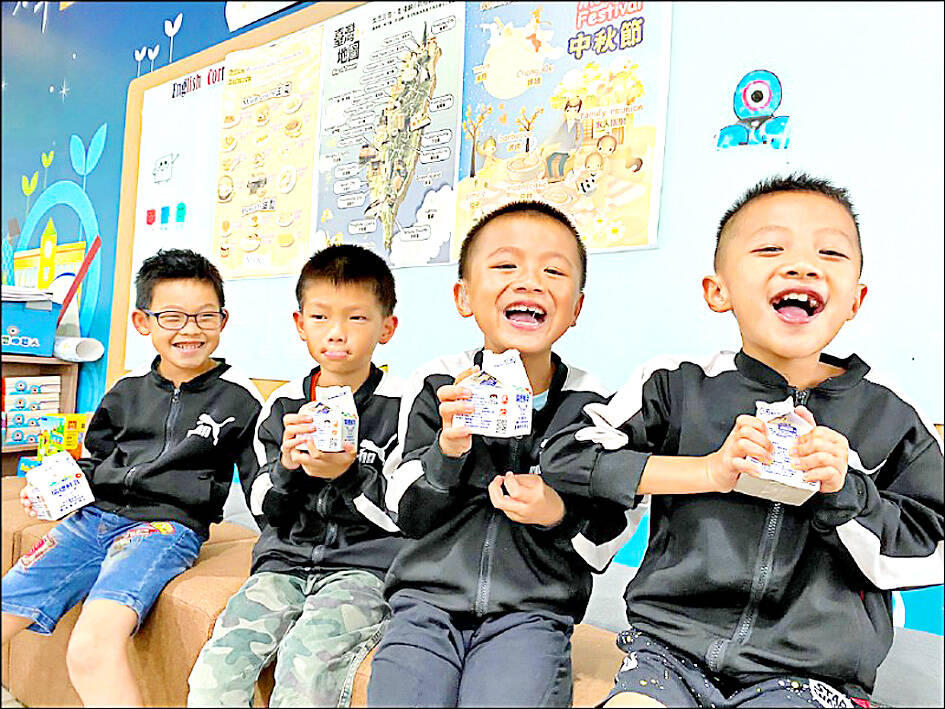The funding for a Ministry of Education program to deliver fresh milk to schools is set to rise to NT$1.5 billion (US$46.7 million) next year, Minister of Education Cheng Ying-yao (鄭英耀) said yesterday.
Cheng made the remarks in a report on the progress of the policy at the Legislative Yuan’s Education and Culture Committee.
Nine cities and counties, including Kaohsiung and Pingtung County, have delivered milk orders to schools, data published on Friday showed.

Photo: Taipei Times file
The Executive Yuan approved NT$710 million for the Ministry of Agriculture this year for the program, which is set to more than double next year to NT$1.5 billion, Cheng said.
Next year’s budget would also be split evenly between the ministries, with the government collaborating with local governments to adjust the budget as needed, he added.
Democratic Progressive Party (DPP) Legislator Chen Pei-yu (陳培瑜) said that many countries and regions, such as Canada, Europe, Japan and the US, provide or subsidize milk for students.
Based on projected twice-a-week deliveries next year, 20,000 tonnes of dairy products would be needed, which only account for 4 percent of domestic production, she said.
It is clear that the goal of this policy is not to harm Taiwan’s dairy industry, but rather to provide students with nutritious meals and support domestic fresh milk producers, she said.
Many parents have expressed hope that the policy can eventually be rolled out to all kindergartens, elementary schools and middle schools, she said.
In places where the government already provides dairy products to students, the ministries should collaborate to revise the policy to promote food and agriculture education, she added.
The policy has good intentions, but it should be implemented carefully to avoid burdening teachers with more responsibilities, DPP Legislator Fan Yun (范雲) said.
Chinese Nationalist Party (KMT) Legislator Wan Mei-ling (萬美玲) said that with 77 percent of schools using extended shelf-life (ESL) milk, the policy’s slogan of “fresh milk for every class” has become “ESL milk for every class.”
Instead, students could be issued fresh milk coupons to reduce schools’ need to invest in refrigeration and storage, she said.
Cheng said that although the coupons had previously been considered, they are imperfect solutions, as some students are unable to purchase fresh milk themselves.
KMT Legislator Hung Mong-kai (洪孟楷) said that three weeks into the school year, many students still do not have milk, and questioned whether the agriculture ministry took precedent over the education ministry.
Cheng said the policy is a result of cross-ministerial collaboration, focused on improving the health of students, and the central and local governments are already working together to adjust it.
KMT Legislator Ko Chih-en (柯志恩) said that in Japan, schools have included milk in their lunches for more than 10 years, and where schools lack a refrigerated supply chain, they must use ESL milk.
He added that the policy has had negative effects such as increasing waste from straws.
The new policy is trying to destroy the domestic dairy industry by allowing imports of “fake” fresh milk, Ko said.
Deputy Minister of Agriculture Tu Wen-jane (杜文珍) said that the ministry’s position is the same as dairy farmers’.

Chinese Nationalist Party (KMT) Chairman Eric Chu (朱立倫), spokeswoman Yang Chih-yu (楊智伃) and Legislator Hsieh Lung-chieh (謝龍介) would be summoned by police for questioning for leading an illegal assembly on Thursday evening last week, Minister of the Interior Liu Shyh-fang (劉世芳) said today. The three KMT officials led an assembly outside the Taipei City Prosecutors’ Office, a restricted area where public assembly is not allowed, protesting the questioning of several KMT staff and searches of KMT headquarters and offices in a recall petition forgery case. Chu, Yang and Hsieh are all suspected of contravening the Assembly and Parade Act (集會遊行法) by holding

PRAISE: Japanese visitor Takashi Kubota said the Taiwanese temple architecture images showcased in the AI Art Gallery were the most impressive displays he saw Taiwan does not have an official pavilion at the World Expo in Osaka, Japan, because of its diplomatic predicament, but the government-backed Tech World pavilion is drawing interest with its unique recreations of works by Taiwanese artists. The pavilion features an artificial intelligence (AI)-based art gallery showcasing works of famous Taiwanese artists from the Japanese colonial period using innovative technologies. Among its main simulated displays are Eastern gouache paintings by Chen Chin (陳進), Lin Yu-shan (林玉山) and Kuo Hsueh-hu (郭雪湖), who were the three young Taiwanese painters selected for the East Asian Painting exhibition in 1927. Gouache is a water-based

Taiwan would welcome the return of Honduras as a diplomatic ally if its next president decides to make such a move, Minister of Foreign Affairs Lin Chia-lung (林佳龍) said yesterday. “Of course, we would welcome Honduras if they want to restore diplomatic ties with Taiwan after their elections,” Lin said at a meeting of the legislature’s Foreign Affairs and National Defense Committee, when asked to comment on statements made by two of the three Honduran presidential candidates during the presidential campaign in the Central American country. Taiwan is paying close attention to the region as a whole in the wake of a

OFF-TARGET: More than 30,000 participants were expected to take part in the Games next month, but only 6,550 foreign and 19,400 Taiwanese athletes have registered Taipei city councilors yesterday blasted the organizers of next month’s World Masters Games over sudden timetable and venue changes, which they said have caused thousands of participants to back out of the international sporting event, among other organizational issues. They also cited visa delays and political interference by China as reasons many foreign athletes are requesting refunds for the event, to be held from May 17 to 30. Jointly organized by the Taipei and New Taipei City governments, the games have been rocked by numerous controversies since preparations began in 2020. Taipei City Councilor Lin Yen-feng (林延鳳) said yesterday that new measures by